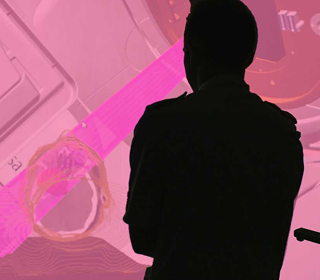
Blog

Halima Bi is a second year Therapeutic Radiography student whose work with breast cancer patients on placement made her realise how crucial spreading awareness really is.
I completed my placement at the Royal Shrewsbury Hospital and the Queen Elizabeth Hospital; both sites gave me great insights into what a career as a therapeutic radiographer is like. I was able to work with amazing staff who taught me so many skills, like how to effectively set up a patient and give pre-treatment chats. Most importantly, I was able to meet patients who always managed to put a smile on my face every day.
The machine setup can be quite daunting for the patient, as they are seeing all this new equipment for the first time. It’s important to talk through all the equipment and processes with the patients so that they feel more at ease and can understand what is taking place, as well as answering any questions they have honestly but reassuringly. As mentioned, this is a difficult time, so asking the patients what is making them feel nervous can help you as a radiographer make it as stress free for them as possible.
This can be an incredibly difficult time for patients as many have undergone surgery and chemotherapy before having radiotherapy. Many must also get used to having a new body shape which can really affect a person mentally. Luckily, there are many support systems available for patients during this difficult time and the level of resilience patients have is greatly admirable. Being able to hear every patient's individual story is rewarding as you get to have an idea of what your patient has been through realise how they’ve dealt with everything.
I met an incredible patient in CT who came in to have a rescan due to the swelling going down on her breast between the time of the first scan and the first treatment session. There ended up being delays for the re-scan but this gave me time to engage with the patient and talk through their experience. This had made me realise how difficult this time has been for the patient especially after hearing everything they were going through in their personal life.
One of the aspects which stuck with me was that the patient was grateful that the cancer was picked up early, and how the spread of awareness and encouragement of checking your breasts is what possibly saved her life. It’s moments like these that made me realise how much of a difference we can make by raising awareness through social media and word of mouth.
Every breast patient is different, which is important to understand. Whilst it may be the same general diagnosis, every patient will go through different feelings and emotions and deal with the situation differently. I remember observing a treatment where the scar from the lumpectomy had become quite infected and so required a bit more care when adjusting the patient's position, as opposed to other patients' scars that healed up very quickly and hadn't had any issues post-operation. It’s important that we judge each case differently so that we provide the right support to each patient.
One piece of advice I would love to give to anyone who is dealing with breast cancer is don’t let the diagnosis define who you are. Continue to meet up with friends and family and live life to its fullest and most importantly prioritise yourself and your health.